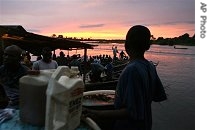-
(单词翻译:双击或拖选)
By Gilbert da Costa
Abuja
03 November 2006
 |
| An unidentified boy sells fuel at the waterside in Yenagoa, Nigeria, Nov. 2 2006 |
According to Ekiyon Wilson, spokesman for the governor of Nigeria's southern state of Bayelsa, the seized men could be released as early as Friday.
The men, a Briton and an American, were abducted1 from a Norwegian ship off the coast of Bayelsa. This is the latest in the wave of kidnappings and violence against the oil industry.
The state government is leading mediation2 efforts. Mr. Wilson told VOA that the kidnappers3, on behalf of the communities in the area, are demanding that the government provide better services in return for freeing the two men.
"Hopefully, they will be released today, hopefully," he said. "We are on it right now. They are demanding for amenities4 in their community. They want water, they want light, they want this, and they want that. It is a community problem. It is not even militants5 problem. It is a community who are demanding for development."
The current wave of attacks on foreigners in the world's eighth largest oil exporter has forced the withdrawal6 of hundreds of workers and a production decline of at least 500,000 barrels a day.
The violence has continued despite the recent pledge by Nigeria's president, Olusegun Obasanjo, to crack down on armed groups in the region.
Sam Oyadoho, a journalist in Bayelsa state, says the payment of ransom7 to obtain freedom for kidnapped oil workers is responsible for the increasing attacks on foreign workers.
"The whole thing is like a business venture for these boys now," he said. "Most times when they say kidnap, kidnap, the next thing government officials will go and negotiate on behalf of the hostages. They will trouble-shoot on behalf of the hostages and get them released. Most times, they will tell us they didn't pay ransom. But if they were not paying ransom don't think this thing [kidnappings] will be so rampant8. So, people on the street, you ask them, they see this whole thing as these boys taking advantage of seizing these people to get money."
Niger Delta9 groups say they are fighting for a greater share of the oil wealth. They say the inhabitants remain impoverished10 despite years of oil production, which has also damaged the environment.
Several foreigners have been kidnapped this year in the troubled region.
Armed groups in the delta say they are planning massive attacks against oil facilities in the next few days.
 收听单词发音
收听单词发音
1
abducted

|
|
| 劫持,诱拐( abduct的过去式和过去分词 ); 使(肢体等)外展 | |
参考例句: |
|
|
|
2
mediation

|
|
| n.调解 | |
参考例句: |
|
|
|
3
kidnappers

|
|
| n.拐子,绑匪( kidnapper的名词复数 ) | |
参考例句: |
|
|
|
4
amenities

|
|
| n.令人愉快的事物;礼仪;礼节;便利设施;礼仪( amenity的名词复数 );便利设施;(环境等的)舒适;(性情等的)愉快 | |
参考例句: |
|
|
|
5
militants

|
|
| 激进分子,好斗分子( militant的名词复数 ) | |
参考例句: |
|
|
|
6
withdrawal

|
|
| n.取回,提款;撤退,撤军;收回,撤销 | |
参考例句: |
|
|
|
7
ransom

|
|
| n.赎金,赎身;v.赎回,解救 | |
参考例句: |
|
|
|
8
rampant

|
|
| adj.(植物)蔓生的;狂暴的,无约束的 | |
参考例句: |
|
|
|
9
delta

|
|
| n.(流的)角洲 | |
参考例句: |
|
|
|
10
impoverished

|
|
| adj.穷困的,无力的,用尽了的v.使(某人)贫穷( impoverish的过去式和过去分词 );使(某物)贫瘠或恶化 | |
参考例句: |
|
|
|















